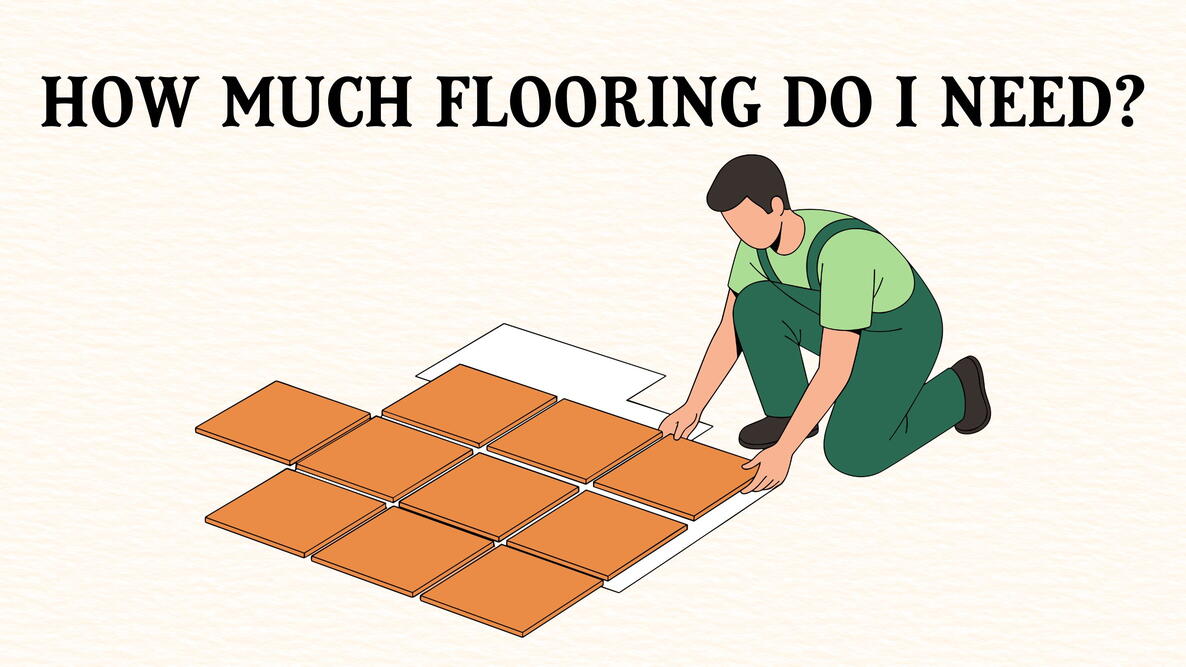Use these handy tricks and tips to figure out exactly how much flooring you need for your home’s tile or vinyl project. Careful measuring before you shop can save money, reduce waste, and make installation much easier.
To calculate tile flooring, measure the room’s length and width, subtract obstructions, and add extra material for cuts and waste.
Tile and Vinyl Flooring Planning Tips
Before purchasing any flooring, make a scale drawing of your room with all measurements clearly marked. Take this drawing with you when you shop for tile or vinyl flooring. If your room includes bay windows, unusual jogs or turns, or if you plan to use special tile patterns or decorative designs, ask a salesperson to help you calculate your needs accurately.
Ceramic Tile Flooring
Ceramic tiles for floors and walls come in a wide range of sizes, from small 1x1-inch mosaics to large 12x12-inch tiles or even larger. The most popular size remains the 4¼-inch square tile, although larger tiles such as 8x8, 10x10, and 12x12 inches are becoming increasingly popular.
Installing larger ceramic tiles can be more challenging because the underlayment must be perfectly even and level. Small one-inch mosaic tiles are often mounted on 12x12-inch or 12x24-inch sheets, making them easier to install. You can purchase premade designs or mix different tile colors to create custom mosaic borders, patterns, or images.
Sheet Vinyl Flooring
Sheet vinyl flooring is typically sold in 6-foot and 12-foot widths. If your floor requires two or more pieces, your estimate must include enough material for overlapping so the pattern can be properly matched. Always account for this extra coverage when calculating how much sheet vinyl to buy.
Vinyl Tile Flooring
Vinyl tiles usually come in 9-inch or 12-inch squares. To calculate how many 12-inch vinyl tiles you need, multiply the length of the room by the width in feet, rounding up any fractions to the next full foot. Add 5 percent extra for cutting and waste. Measure any fixed obstructions, such as cabinets or appliances, and subtract that square footage from your total.
To calculate the number of 9-inch tiles, divide the room’s length in inches by 9, then divide the width in inches by 9. Multiply those two numbers together to find the total number of tiles needed, and add 5 percent for cutting and waste.
Frequently Asked Questions
How do I calculate how much tile flooring I need?
Measure the length and width of the room to find the total square footage. Subtract the area of permanent obstructions, then add extra material (usually 5–10 percent) for cutting and waste.
How much extra tile should I buy for waste?
For most tile projects, adding 5 percent is sufficient. If your room has unusual angles, patterns, or borders, consider adding closer to 10 percent.
What size ceramic tile is best for flooring?
While 4¼-inch tiles are traditional, larger tiles such as 8x8 or 12x12 inches are increasingly popular. Keep in mind that larger tiles require a perfectly level subfloor for best results.
How is sheet vinyl measured?
Sheet vinyl is sold in standard widths, usually 6 or 12 feet. If more than one piece is needed, be sure to allow extra material for overlapping and pattern matching.
Is vinyl tile easier to measure than ceramic tile?
Yes. Vinyl tiles come in standard sizes, making it easier to calculate how many tiles you’ll need by dividing the room dimensions and adding a small amount for waste.
Accurate measurements and a clear plan are essential when buying tile or vinyl flooring. Taking the time to measure carefully and account for waste will help ensure you purchase the right amount of material and avoid unnecessary delays during installation.










Comments